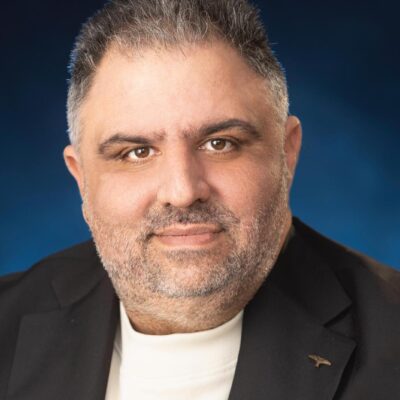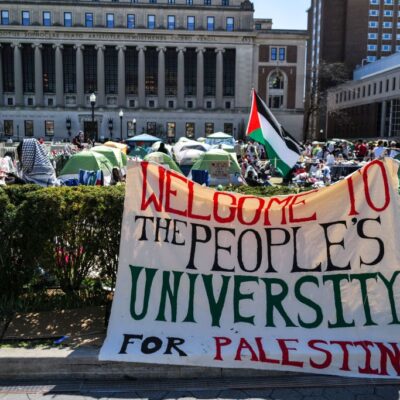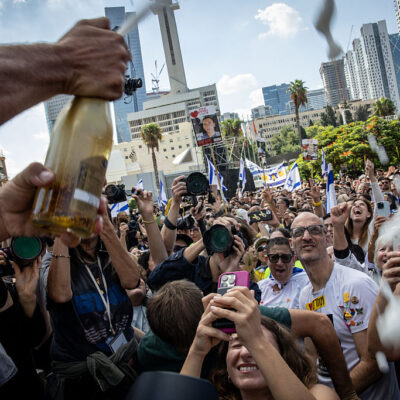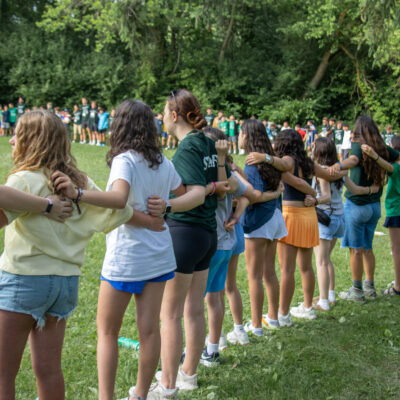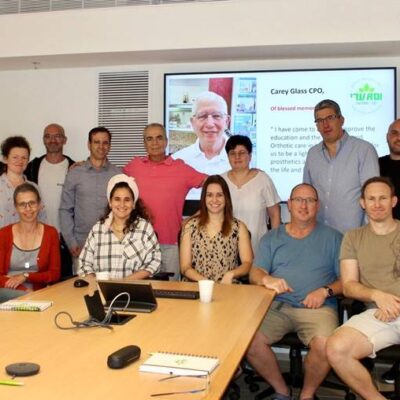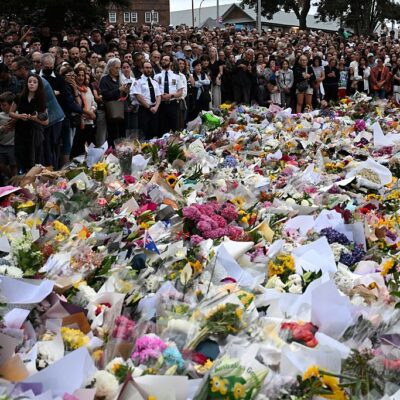Your Daily Phil: Oct. 7, one year later
Today is Monday morning, the first anniversary of the Oct. 7 Hamas terror attacks on Israel.
In today’s edition of Your Daily Phil, we report on the psychological toll that the Oct. 7 attacks and the past year of war has had on Israelis, look at how two universities on either side of the country are preparing for the Oct. 7 anniversary and speak to ADL CEO Jonathan Greenblatt about the “explosion” of antisemitism over the past year. We feature an opinion piece by Ariel Zwang and Hadas Minka-Brand, as well as one by Kim and Alan Hartman, sharing several takeaways from the Jewish funder community’s efforts to support Israelis during a year of tragedy and tumult. Also in this newsletter: Shira Hutt, Seth Klarman and Batsheva Yahalomi. We’ll start with a memorial ceremony today for the victims of the massacre at the Nova music festival.
A heavy silence hung in the air, broken at times by a wail and by the pounding of not-too-distant artillery cannons, at the site of the Nova music festival at 6:29 a.m. this morning — the moment when one year ago today Hamas launched its deadly assault on southern Israel, in which some 1,200 people — mainly civilians — were killed, thousands more were wounded and over 250 taken hostage. A year later, 101 remain in captivity, with no serious negotiations underway to secure their release as Hamas has abandoned the talks.
Approximately 1,000 people — mainly family and friends of those murdered at the Nova festival — gathered at the site, outside Kibbutz Re’im, for the one-year anniversary, reports eJewishPhilanthropy’s Judith Sudilovsky from the memorial.
Before the service and afterward, they gathered at the makeshift memorial that has been built at the site, lighting candles and saying prayers at the photograph-topped markers for each of the 364 people who were murdered at the festival.
“I come here every two weeks,” Moti Harlev, whose 41-year-old daughter, Hila Keylin, came to the Nova festival to celebrate her Oct. 5 birthday, told eJP.
“This is the last place where she enjoyed herself. And because of that I come here,” said Harlev, who came with his family, including three of Keylin’s four children. (The youngest, 9, stayed home.) “We help her children as much as we can. They came here today, but I’m not sure it is good for them.”
The organizers of the memorial service had originally planned to sound a siren to mark the moment, but the Israel Defense Forces’ Home Front Command would not allow it out of concern that it would confuse attendees in case of a rocket attack at the same time. (This was not unfounded: four rockets were fired from Gaza at the nearby Israeli communities at 6:30 — three were intercepted and the fourth struck an unpopulated area — and the Israeli military said it thwarted such a larger barrage that Hamas had planned to carry out.)
The organizers played the final song that was performed at the festival before the massacre began — “Clear Test Signal” by Pixel & Space Cat. During the service, Menashe Mansouri, who lost two daughters and a future son- in-law said the Yizkor (memorial) prayer, and Dasi Aviad who lost a son recited El Maleh Rachamim (God full of mercy). Jojo Rabia and Yoav Rivlin, who both lost two sons (Rabia also lost a future daughter-in-law) said Kaddish. Eric Goldstein, the CEO of UJA-Federation of New York, also spoke at the memorial, bringing “strength and solidarity” from the Jewish community of New York and highlighting the projects that his organization has funded in support of the survivors of the Nova massacre and families of the victims.
“The horrific massacre that took place right here and across the [Gaza border] region on Oct. 7 changed Israel forever. But it also forever changed world Jewry,” Goldstein said. “You and your loved ones were on the front lines and you continue to be. But we the Jews of America deeply understand that an attack against you is an attack against us and we Jews in America are vulnerable when Israel is vulnerable.”
“Your fight is our fight. Do not think for a moment that you are alone,” he continued. “The courage, the unbreakable spirit, and the determination of the Nova tribe to keep dancing has moved all of us in an incredibly profound way. The road ahead remains long and is uncertain, but please know that the New York Jewish community, the American Jewish community, will be with the Nova tribe and all of the people of Israel forever.”
Israeli President Isaac Herzog and his wife, First Lady Michal Herzog, attended the ceremony but did not make a public address. Afterward he spoke to journalists, calling the Oct. 7 attacks a “scar on humanity… a scar on the face of the Earth.”
“We have to do whatever we can by all ways and means possible to bring back our hostages who are there in the tunnels and dungeons of Gaza. And the world has to realize and understand that in order to change the course of history and bring peace, a better future to the region, it must support Israel in its battle against its enemies,” Herzog said. “Blessed be those who fell, who were murdered and killed here. Young people who came to celebrate and enjoy dance and music — to live a real life of young people as any young person should be entitled to. Let us remember them forever.”
PSYCHOLOGICAL ASSESSMENT
With far too many in need and not enough therapists, Israel in a ‘race against time’ to treat country’s trauma

With hundreds of thousands of Israelis affected by the events of Oct. 7 — including survivors of the terrorist attack, evacuees, friends and families of hostages and families of reservists — Israel has been dealing with unprecedented numbers and trauma needs, with the Israel Trauma Coalition calling it a “race against time” to reduce the risks of widespread chronic trauma to help Israelis “find hope and resilience once again,” reports eJewishPhilanthropy’s Judith Sudilovsky.
A ‘mind-boggling’ problem: The number of people needing therapy services is “mind-boggling,” ITC CEO Talia Levanon said. In 2020, the resilience centers worked with 8,000 clients nationwide; since Oct. 7, that number has grown almost five-fold, she said. The need is much greater than the number of clinicians available. For example, she said, even though they have increased the number of clinicians in the resilience center for the Gaza envelope from 240 to 1,400, it is still not enough.
It’s everywhere: The Joint Distribution Committee’s Israel director, Efrat Stern, said the population that previously had stable lives has suddenly found itself in a vulnerable state, with some 55% of the population in Israel experiencing anxiety on a clinical level. In addition, according to a JDC statement, with 83% of Israeli children showing symptoms of profound distress since Oct. 7, Israel has seen a significant increase in the number of individuals requiring mental health services. However, 65% of the population do not recognize themselves as people that need some kind of help, making reaching out to them for treatment more complicated, Stern said. “When we talk about the mental health situation of people in the population in Israel, it’s [not just] about people with mental illnesses; we’re talking about the mental situation of each and every one of us,” said Stern.
A TALE OF TWO SCHOOLS
3,000 miles apart, two campuses plan to quietly mark Oct. 7 — and hope for peace

Jewish faculty members, staff and students at Columbia and Stanford University spoke to eJewishPhilanthropy’s Haley Cohen and Jewish Insider’s Gabby Deutch about their hopes for the new school year ahead of today’s anniversary of the Oct. 7 Hamas attacks. At both campuses, they spoke with a gritty weariness developed after Oct. 7 upended life for Jewish students on campuses across the United States.
Time to prepare: Summer vacation offered university administrators an opportunity to start fresh — to return to first principles, and figure out what, exactly, matters to them when it comes to creating an inclusive environment where students can both exercise their freedom of speech and feel safe while expressing their identity. Those principles will be put to the test as the first anniversary of Oct. 7 approaches.
The real test: Jeffrey Koseff, a Stanford engineering professor and the co-chair of an advisory committee formed to study antisemitism at the university, said counterprotests on Oct. 7 could be a “bellwether” for the year ahead. “We were warned over the summer, ‘Oh God, there’s going to be this, there’s going to be that.’ But there’s so many other things happening on campus right now that I think have got people diverted.”
Read the full report here and sign up for Jewish Insider’s Daily Kickoff here.
ALARM BELL
ADL CEO Greenblatt: American Jewish community is at an ‘inflection point’ as antisemitism skyrockets

Antisemitic incidents in the U.S. are hitting unprecedented highs not seen in a century, Anti-Defamation League CEO Jonathan Greenblatt told Jewish Insider ahead of the anniversary of the Oct. 7 Hamas attack on Israel, bringing the community to an “inflection point.” ADL has recorded more than 10,000 antisemitic incidents in the U.S. since Oct. 7, new data released by the group on Sunday revealed, a record high since ADL began tracking such data in 1979. The number of antisemitic episodes has more than doubled from the year prior, reports Marc Rod for Jewish Insider.
An explosion: “This is a moment in time the likes of which we haven’t seen in well over a century,” Greenblatt told JI. “Even prior to Oct. 7, we had seen … an increase in antisemitic incidents. A worsening of antisemitic attitudes. Since 10/7, things have exploded.” He described the situation as “unprecedented and unacceptable,” with Jews going to significant lengths to hide Jewish symbols and affiliations on college campuses and in their professional life, and finding themselves ostracized and bullied in the classroom and the workplace.
Not just campuses: Much of the Jewish community’s focus in the past year has been on college campuses; Greenblatt said that around half of the incidents ADL recorded have been on campuses — but the remainder have happened in a range of other non-campus settings. (After Oct. 7, ADL included anti-Zionist chants and slogans as part of its count of antisemitic incidents.) “There’s a lot happening in political spaces, in public places that would merit more attention,” he said, in addition to other forms of discrimination and exclusion that are harder to conclusively identify and report.
TOMORROW STARTS TODAY
For Israel’s next chapter, big solutions for big challenges

“Over the last year, we have witnessed Israeli society pushed to the brink by unprecedented challenges,” write Ariel Zwang, CEO of the American Jewish Joint Distribution Committee (JDC), and Hadas Minka-Brand, executive director of JDC-Israel, in an opinion piece for eJewishPhilanthropy.
Expanding circles of vulnerability: “More than 185,000 Israelis are seeking employment, including evacuees and reservists who’ve returned from military service without jobs; and, according to our estimates, 40% of employed evacuees are now at risk of losing their jobs. Anxiety is prevalent among approximately 55% of Israeli adults; there is a large-scale decline in the physical, mental and social capacity of the country’s oldest citizens, Israel’s founding generation; and Israeli youth have suffered a severe post-Oct. 7 uptick in rates of depression, anxiety, loneliness and substance abuse. The impacts of these crises are profound and multifaceted, and they require us to craft responses that prioritize those who were vulnerable before the war and those who’ve been plunged into vulnerability since its onset.”
Lessons worth sharing: “We have a moral obligation to act swiftly and effectively to confront these immediate social needs and to lay the groundwork for a resilient future, driven by a unity of purpose. This approach — embracing the opportunity found in each crisis — is a necessity for rebuilding a stronger Israel… Before the war, 1 million Israelis were helped every week by social services we created. After Oct. 7, we expanded our reach and have directly aided more than 450,000 of the hardest-hit Israelis through our emergency services. We have learned three valuable lessons from this work — lessons that will determine the success of our shared project to rebuild a stronger Israel and reach the millions waiting for our support.”
GIVE LOCALLY, QUICKLY AND DIFFERENTLY
We’ve supported over 180 Israeli grassroots projects since 10/7. Here’s what we’ve learned.

“The infrastructure of large philanthropies serves an important purpose when crafting long-term grantmaking strategies for systemic change over long periods,” write New York-based philanthropists Kim and Alan Hartman in an opinion piece for eJewishPhilanthropy, “but what Israel faced over the last year was a dramatically sudden and unprecedented crisis: Tens of thousands of people displaced from their homes; hundreds taken hostage; reservists leaving their families and businesses to deploy to a combat zone for an extended period; and many families mourning their loved ones or awaiting their uncertain fate.”
Moved to take action: “As American Jews heartbroken by the Hamas attacks and witnessing ordinary Israelis spring into action in response to the crisis, we felt an urgent need to take action ourselves — by making sure to get funds quickly into the hands of those who knew their communities’ needs best. That’s what inspired us and our partners at the Shaharit Institute to launch the Daybreak Fund. In the year since Oct. 7, Daybreak has provided emergency micro grants to 185 Israeli grassroots projects, the vast majority of which did not exist before the war began.”
One year later: “A few weeks ago, we traveled to Israel to meet with many of these incredible grantees in person. We toured their communities and the sites of their work, seeing how they’re making a difference in the field… From what we saw and heard in Israel during this visit and what we’ve witnessed over the past year, we’ve taken away three key lessons about how philanthropists can make an impact in times of unprecedented struggle and adversity.”
Worthy Reads
Looking Back, Looking Forward: In the Jerusalem Post, Shira Hutt, the executive vice president of the Jewish Federations of North America, reflects on the past year. “Yes, one year later, the anguish of October 7 still haunts our community. And yet we have confronted these challenges with strength and determination – first and foremost, responding in a historic way to the needs of our brothers and sisters in Israel with over $850M raised from the Jewish Federation system alone – all while being confronted by increased challenges to our community in America… We organized and supported hundreds of commemoration events across North America, which will bring hundreds of thousands of people together to support and uplift one another. And next month, we will gather again in Washington, DC, to bring our community together in a unity event called Stand Together… There has been a surge in involvement and engagement in every sector of Jewish life — synagogues, JCCs, day schools, camps, and on and on. Perhaps the greatest period of Jewish life in America is still to come if we stay true to our values, focus on embracing this surge, and refuse to allow our detractors to set our communal agenda.” [JerusalemPost]
She Had No Idea: In The Times of Israel, Adele Raemer of Kibbutz Nir Oz considers the woman in the photo of her 5784 New Year’s card and how different she is from Raemer today. “I look at that photo now and tears come to my eyes. I can barely recognize myself from way back then – all of a year ago. There is an innocence and a joy I can see in my face that I do not see anymore. Life back then seemed about as good as it can get – living in the same kibbutz as my youngest daughter and three of my granddaughters, all of them just a minute’s bike ride away… How ignorant the ‘Adele’ in that picture was, of the impending onslaughts and catastrophic changes that were soon to impact all those in her region. She had no idea of how many close friends and acquaintances she was soon to lose. She had no inkling of how profoundly her life was on the cusp of being violently uprooted and changed. She couldn’t have even dreamed that she would be a refugee in her own land within a few weeks from then, for the indefinite future.” [TOI]
Synagogues Should Step Up: In Deseret News, professor Samuel J. Abrams argues that synagogues are in a position to play a greater supporting role for Jewish students on U.S. campuses. “A recent Jim Joseph Foundation campus report confirmed what I saw with my own Jewish students — they were not particularly engaged with the work of formal organizations like Hillel or the American Jewish Committee… So what are Jewish students drawn to? My students tell me that Shabbat and holiday programs, social events, and anything that helps them connect with and support one another make a crucial impact. This is exactly where synagogues can and must step up; they can play a huge supporting role to Jewish students… These ‘houses of assembly’ must now be places that are far more than places for prayer, preaching or text study; they must literally provide sanctuary for our students who need community, camaraderie and congregation. Religious and lay leadership should be reaching out to Jewish students and letting them know that they are there for them. Synagogue doors must be thrown open, and students must be welcomed and embraced.” [DeseretNews]
Word on the Street
Jewish communities, organizations and governments around the world will mark the anniversary of the Oct. 7 Hamas terror attacks today; a ceremony organized by bereaved families in Tel Aviv, which will include a global moment of silence, will also be livestreamed at noon ET…
In The Wall Street Journal, former hostage Sahar Calderon calls for her father’s release from Hamas captivity, while in The New York Times, 86-year-old Yaffa Adar recalls her time in captivity…
Haaretz reports on the environmental damage to Israel caused by the past year of war…
In an opinion piece in The Hill, Rabbi Marc Schneier argues for restarting normalization efforts between Israel and Saudi Arabia, saying it would be the “most effective punishment” for Hamas and Iran for their aggression over the past year…
The Associated Press spotlights Pittsburgh’s Jewish community, which is marking both the one-year anniversary of the Oct. 7 attacks and the six-year anniversary of the Tree of Life shooting…
The New York Times examines American Jews’ increased engagement with Jewish communal life over the past year…
A Jewish Agency survey found that global Jewish population reached 15.8 million on the eve of Rosh Hashanah — an increase of some 100,000 over the past year, but still some 800,000 short of the Jewish population on the eve of the Holocaust — with 7.3 million Jews living in Israel and 6.3 million in the United States…
A Yazidi woman who was kidnapped by ISIS from Iraq in 2014 at the age of 11 and transferred to the Gaza Strip was rescued by Israeli forces and reunited with her family in Iraq last week, with assistance from Jewish philanthropist Steve Maman…
The Financial Times interviews Apollo Global co-founder Marc Rowan about the evolution of Wall Street investing…
NBC investigates antisemitic attacks against Jewish students on college campuses…
Meyer and Renee Luskin donated $25 million to the UCLA department of history; the couple has previously donated $100 million to the school to create the Luskin School of Public Affairs and the Meyer and Renee Luskin Conference Center…
The Wall Street Journal reports on Jared Kushner and Ivanka Trump’s plans to build resorts along the Albanian coast…
The Alfred E. Mann Charities Inc., donated $1 million to Los Angeles Jewish Health toward the organization’s newest location, the Brandman Centers for Senior Care…
Inside Philanthropy examines the charitable giving of investor Seth Klarman and his wife, Beth…
Last week, the City of New York named the corner of 44th Street and Seventh Avenue “Sumner Redstone Way” in honor of the late media mogul and philanthropist…
The New York Post looks at New York Mayor Eric Adams’ outreach to Jewish donors for support following his indictment…
The Jews Indigenous to the Middle East and North Africa organization released the fourth issue of its journal, Distinctions, which focuses on how Jewish communities have instilled resilience through “culture, values and faith across generations”…
A new survey by Fidelity Charitable found that more than three-quarters of donors around retirement age — 78% — say charitable giving plays a significant role in their lives…
Puck looks at how businessman Ron Perelman lost much of his personal fortune, which had been worth nearly $20 billion, and the effects that it has had on — among other things — his philanthropy…
Former Brooklyn District Attorney Eugene Gold, who led the prosecution of the “Son of Sam” killings and fought for Soviet Jewish emigration, died in August at 100…
Pic of the Day

Batsheva Yahalomi, 45, a survivor of the attack on Kibbutz Nir Oz and the mother of released hostage Eitan Yahalomi, holds a sign last month calling for the release of her husband, Ohad Yahalomi, who remains a hostage, at her new home in Kibbutz HaOgen in central Israel.
Jewish Insider’s executive editor, Melissa Weiss, interviewed Yahalomi and revisited Nir Oz and many of the other communities targeted in the Oct. 7 attacks ahead of the one-year anniversary today.
Birthdays

Former chair of the Jewish Foundation for Education of Women and senior advisor to the chairman of the Genesis Prize Foundation, Jill Smith…
Retired chairman and CEO of Halco Lighting Technologies, Allan Nelkin… Former owner of Murray’s Cheese, the nation’s leading purveyor of artisanal cheese, Rob Kaufelt … Highland Park, Ill., resident, Margery Nyberg… President of the Russian Federation, Vladimir Putin… Former national chair of the Anti-Defamation League and member of its board of directors, Barry Curtiss-Lusher … Founder of the Republican Jewish Coalition of California and a former member of the U.S. Holocaust Memorial Council, Bruce Lawrence Bialosky… Retired deputy director of community security at the Jewish Federation of Palm Beach County, Ron Vosatka… Co-founder of the Israel Policy Forum in 1993, Michael W. Sonnenfeldt… Founder and chair of the Louis D. Brandeis Center for Human Rights Under Law, he served as assistant secretary of education in the Trump administration, Kenneth L. Marcus… President of Detroit’s Imperial Management and a board member of the William Davidson Foundation, Eli Saulson… Creator, host and producer of Extra Virgin on the Cooking Channel, Gabriele Corcos… Rabbi of Temple Emanu-El in Closter, N.J., Rabbi David-Seth Kirshner… Composer for musical theater on Broadway and the West End, Matthew Sklar… Political fundraiser and strategist, Arie Lipnick… Member of the Knesset for the Shas party since 2016, now serving as the minister of religious affairs, Michael Malchieli… Director of the leadership institute at AIPAC, Natalie Lascar Lefkowitz… Senior director for philanthropic initiatives at the Jewish Federations of North America, Adam Teitelbaum… CEO of Holbrook, N.Y.-based MW Impressions, Daniel Mael… Executive assistant for global client operations at WPP, Tayla Harris… Manager of editorial and content strategy for the U.S. Holocaust Memorial Museum Magazine, Barbara E. Martinez… Senior associate on the real estate team at Korn Ferry, Samuel Schear… Co-founder and chief growth officer at Riseup, Tamara Harel-Cohen…


 Add EJP on Google
Add EJP on Google